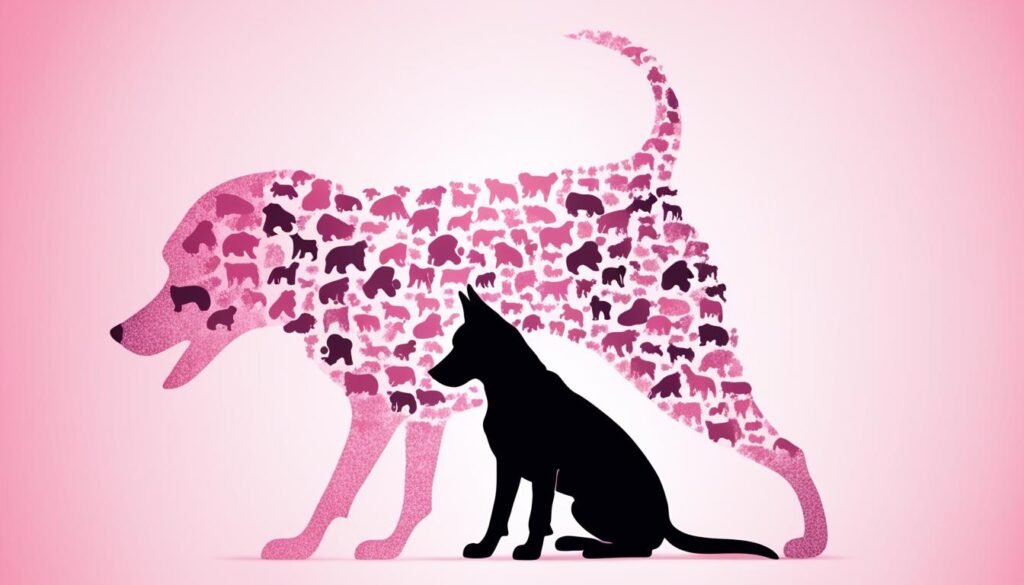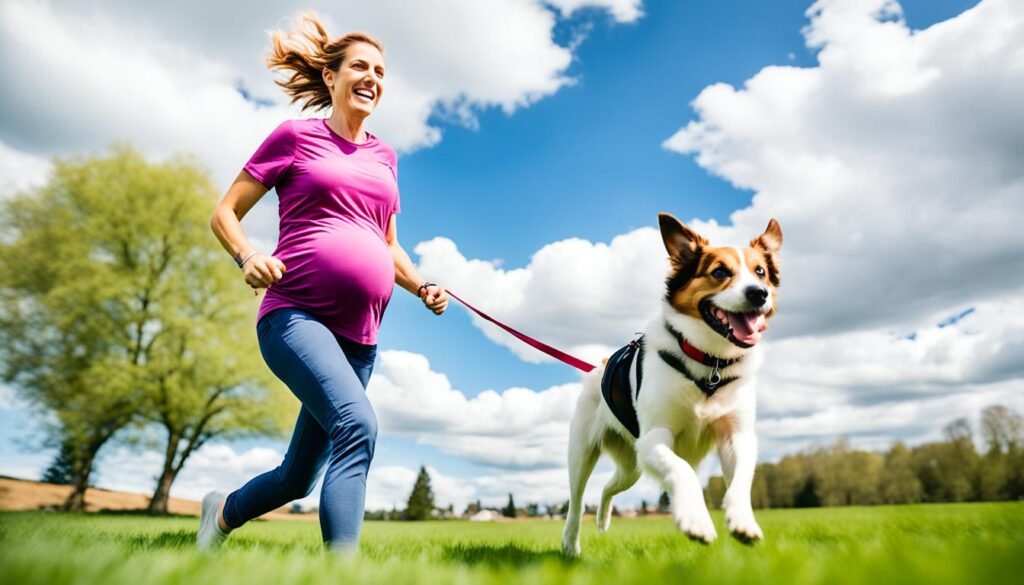Have you ever wondered if dogs can experience the joy of motherhood too? Well, the answer is a resounding YES! Just like humans, dogs can also get pregnant and bring adorable puppies into the world. But how can you tell if your furry friend is expecting? And what steps should you take to ensure their health and well-being during this special time? Let’s delve into the fascinating world of dog pregnancy and explore the signs that indicate your dog is going to be a proud mama
Thank you for reading this post, don't forget to subscribe!As a responsible pet owner, it’s crucial to be familiar with the signs that hint at the arrival of furry bundles of joy. While some signs can be subtle, others are more evident and require your attention. By recognizing the early indications of pregnancy and providing the necessary love and care, you can support your dog through this remarkable journey. So, without further ado, let’s uncover the telltale signs that your beloved pup is expecting.
Key Takeaways:
- Dogs can indeed get pregnant and experience the joy of motherhood.
- Recognizing the signs of pregnancy in dogs is important for a pet owner.
- Being attentive to changes in behavior and physical appearance is crucial.
- Monitoring your dog’s health and providing appropriate care can ensure a successful pregnancy.
- Understanding the signs and taking necessary steps can help you prepare for the arrival of adorable puppies.
The Duration of Canine Pregnancy
Canine pregnancy typically lasts between 61 and 65 days, but can vary depending on the breed and individual factors. It is important to accurately determine the conception date to estimate the due date. Understanding the duration of canine pregnancy is crucial for providing proper care and preparing for the arrival of the puppies.
During the initial stages of pregnancy, the fertilized eggs travel down the fallopian tubes and implant in the uterus. From this point on, the puppies begin to develop, and the gestation period begins.
As the pregnancy progresses, physical symptoms may become more noticeable. Your dog’s belly will slowly enlarge as the puppies grow, and you may be able to feel movement in her abdomen. It’s important to provide your pregnant dog with a safe and comfortable environment during this time.
“Understanding the duration of canine pregnancy is critical for providing proper care and preparing for the arrival of the puppies.” – Dr. Jane Williams, Veterinary Specialist
By accurately determining the conception date, you can estimate the due date and start preparing for the birth. This includes setting up a whelping area, gathering necessary supplies, and ensuring you have the support of a veterinarian if needed.
Remember, every dog is different, and there can be variations in the duration of pregnancy. Some dogs may give birth a few days earlier or later than the average timeframe. Always consult with your veterinarian for specific guidance and advice based on your dog’s individual needs and circumstances.
Detecting Pregnancy in Your Dog
Detecting pregnancy in dogs can be challenging, as it is not as simple as taking a pregnancy test. However, by observing certain signs and changes in your dog’s behavior and physical appearance, you can determine if she is pregnant.
One of the early warning signs of pregnancy in dogs is a change in appetite. You may notice that your dog’s appetite decreases or becomes more selective. Additionally, you may observe changes in her physical activity levels. Pregnant dogs tend to become less active and may prefer to rest or sleep more than usual.
Physical and behavioral changes can also be indicators of pregnancy. Keep an eye out for enlarged nipples, as they often become more prominent and may appear pink or swollen. Abdominal enlargement is another common sign, as pregnant dogs develop a rounded belly as the pregnancy progresses. Nesting behavior is also a significant clue, as pregnant dogs may start to create a comfortable space for themselves and their future puppies. Reduced playfulness and a more nurturing personality can also be signs that your dog is expecting.

Nutrition for Your Pregnant Dog
Proper nutrition is crucial for the health of your pregnant dog and the development of her puppies. During pregnancy, a dog’s nutritional needs increase, requiring a balanced and nutritious diet. It’s important to provide the right food to ensure the well-being of both the mother and her growing puppies.
One option for a dog pregnancy diet is high-quality puppy chow formulated specifically for pregnant dogs. This type of food is designed to meet the increased nutritional demands during pregnancy. Look for puppy chow with a balanced combination of protein, fats, and carbohydrates to support the mother’s health and promote proper growth of the puppies.
Supplementation can also be an important part of a pregnant dog’s diet. Talk to your veterinarian about adding appropriate supplements to her meals to support her overall health and the development of the puppies. Supplements such as omega-3 fatty acids, folic acid, and calcium can be beneficial, but it’s important to consult with a professional to ensure the right dosage and suitable options for your dog.
Remember that every dog is unique, so it’s essential to consult with your veterinarian to create a tailored diet plan that meets your dog’s specific needs. Factors such as breed, size, age, and overall health should be considered when determining the appropriate nutrition for your pregnant dog.
By providing your pregnant dog with a nutritious and well-balanced diet, you are giving her the best chance at a healthy pregnancy and successful delivery of the puppies.
Additionally, ensure your pregnant dog has access to fresh water at all times. Staying hydrated is crucial for her overall health and the development of the puppies.
Monitor your dog’s body condition closely during pregnancy. If you notice any significant changes in weight, consult your veterinarian to adjust the diet accordingly. Overfeeding can lead to excessive weight gain and potential complications, while underfeeding can result in poor growth of the puppies.
Remember, caring for a pregnant dog extend beyond nutrition. Regular veterinary check-ups, proper exercise, and providing a safe and comfortable environment are essential for her overall well-being during this special time.
Exercise and Activity for Pregnant Dogs
During pregnancy, it is important to prioritize exercise and activity for your pregnant dog. Moderate exercise is not only beneficial for maintaining her physical health but also helps regulate her energy levels. Understanding your dog’s energy levels and adjusting exercise routines accordingly is key to ensuring her well-being.
Gentle play sessions and short walks are highly recommended for keeping your pregnant dog active without overexertion. Engaging in gentle play activities, such as tossing a soft ball or playing with interactive toys, helps stimulate her mind and maintain her physical fitness. These activities should be based on her comfort level and physical condition.
Short walks provide an opportunity for your pregnant dog to get fresh air and stretch her legs. It is important to keep the walks relaxed and at a pace that is comfortable for her. Avoid long distances or strenuous activities that may cause fatigue or stress.
Keep in mind that as your pregnant dog’s pregnancy progresses, her energy levels may decrease naturally. She may require more frequent rest periods and shorter exercise sessions. Pay close attention to any signs of fatigue, such as excessive panting or slowing down during walks, and adjust accordingly.
Additionally, maintaining a consistent exercise routine throughout the pregnancy can help prepare your dog for the physical demands of labor and delivery. It is essential to consult with your veterinarian to ensure that your dog’s exercise regimen aligns with her specific needs and any potential health considerations.

How to Care for Pregnant Dogs
Caring for pregnant dogs involves providing adequate nutrition, exercise, and closely monitoring their health. It is crucial to be observant of any changes in behavior, appetite, and physical appearance. Regular veterinary check-ups and proper grooming can also contribute to the overall well-being of the pregnant dog.
During pregnancy, a balanced and nutritious diet is essential for the health of the mother and the development of the puppies. Consult with your veterinarian to determine the appropriate food and feeding schedule for your pregnant dog. Additionally, consider incorporating supplements that support the nutritional needs of the pregnant dog.
Exercise is an important part of caring for pregnant dogs. However, it is crucial to be mindful of their energy levels and adjust their exercise routine accordingly. Gentle play and short walks are recommended to keep the pregnant dog active without overexertion. Provide a comfortable and safe environment for exercise, avoiding potential hazards that may harm the mother or the puppies.
Regular veterinary check-ups are vital to ensure the well-being of the pregnant dog and to address any potential complications. Your veterinarian will monitor the dog’s health, perform necessary tests, and provide guidance throughout the pregnancy. Keep an eye on any abnormal symptoms and seek veterinary attention if you notice heavy bleeding, mucus with spots of blood, or a foul odor in the mucus.

Grooming is another essential aspect of caring for pregnant dogs. Regularly brush their coat to maintain cleanliness and minimize shedding. Pay attention to their dental hygiene and provide appropriate dental care. Trim their nails regularly to prevent discomfort or injuries.
Creating a stress-free environment is essential for the well-being of the pregnant dog. Minimize loud noises and excessive activity that may cause stress. Provide a comfortable and quiet resting area where the pregnant dog can relax and nest.
Lastly, be prepared for the arrival of the puppies by setting up a designated whelping area. This area should provide privacy, warmth, and comfort for the mother and the puppies. Adequate bedding, heating pads, and a whelping box should be prepared ahead of time to ensure a smooth and safe birthing process.
Preparing Your Home for a Litter
Creating a safe and comfortable environment is crucial for the well-being of your pregnant dog and the upcoming litter. Prepare a designated whelping area that provides privacy and warmth for your dog. This area should be free from distractions and other pets, ensuring a calm and stress-free space for the whelping process.
Adequate bedding is important to provide comfort for the mother and the puppies. Choose soft and washable materials that are safe for the puppies to lie on. Avoid using blankets or towels with loose threads or small parts that can pose a choking hazard.
To maintain a warm and cozy environment, consider using heating pads designed for whelping. These pads can be placed underneath the bedding to provide a gentle and consistent source of warmth for the newborn puppies.
Setting up a whelping box is essential for containing the puppies and keeping them secure. The box should be large enough for the mother to comfortably move around but also have low sides to prevent the puppies from accidentally falling out. Line the box with the chosen bedding material before the expected due date.
Note: A whelping box should be easily accessible for the mother but also secure enough to prevent the puppies from wandering off or getting injured. It is crucial to monitor the puppies closely during the first few weeks to ensure their safety.
Prioritize cleanliness in the whelping area to maintain a hygienic environment for the mother and the puppies. Regularly clean and sanitize the whelping box and surrounding area to minimize the risk of infections. Avoid using strong chemicals or cleaning agents that may be harmful to the puppies.
| Essentials for the Whelping Area | Additional Considerations |
|---|---|
| Whelping box | Easy access to fresh water for the mother |
| Bedding | Soft toys for mental stimulation |
| Heating pad | Backup plan for emergency veterinary care |
| Thermometer | Camera for documenting the birth process |
Monitoring Health: When to See a Vet
To ensure the health and well-being of your pregnant dog and her future puppies, regular veterinary check-ups are essential. These check-ups allow veterinarians to monitor the progress of the pregnancy and identify any potential complications that may arise.
During pregnancy, it is crucial to be vigilant and aware of any abnormal symptoms that may indicate a need for immediate veterinary attention. Some signs that should prompt a visit to the vet include:
- Heavy bleeding
- Mucus with spots of blood
- Foul odor in mucus
If you observe any of these symptoms, it is important not to delay seeking veterinary care. Prompt intervention can help prevent further complications and ensure a safe and healthy whelping experience.
Consulting a vet throughout the pregnancy is also advised. Your veterinarian can provide guidance on nutrition, exercise, and overall care for your pregnant dog. They will also be able to address any concerns or questions you may have, offering peace of mind during this important journey.
Remember, regular veterinary check-ups and open communication with your vet are crucial elements in maintaining the health of your pregnant dog and ensuring a successful pregnancy.
Key Developments in Dog Pregnancy
Dog pregnancy is an intricate process that involves several key developmental stages for the puppies. Understanding these stages, ranging from conception to fetal development, is essential for pet owners to provide appropriate care and support for the pregnant dog. Being aware of the changes happening inside the dog’s body and preparing for the upcoming birth ensures a healthy and successful whelping experience.
“Understanding the key developments in dog pregnancy provides valuable insights into the intricate process of bringing new life into the world. It allows us to nurture and support the pregnant dog to ensure the health and well-being of both mother and puppies.”
During the first weeks of pregnancy, the fertilized eggs undergo cell division and implantation in the uterus. Development progresses rapidly, and by the fourth week, the puppies’ hearts start beating. At this stage, it is crucial to provide the pregnant dog with a nutritious diet and appropriate supplementation to support the growth and development of the puppies.
| Week | Milestone |
|---|---|
| 4-5 | Embryonic development |
| 6-7 | Formation of organs |
| 8-9 | Growth of skeletal system |
| 10-11 | Coat color and pattern development |
| 12-14 | Fetal movement |
As the pregnancy progresses, the puppies’ organs continue to develop, and their skeletal systems grow stronger. By weeks 10-11, the puppies’ coat color and pattern begin to form. During the last stage of pregnancy, typically between weeks 12-14, the puppies become more active and their movements can be felt by the mother dog.
Understanding these key developments enables pet owners to anticipate the needs of the pregnant dog and provide the appropriate care and support required at each stage of pregnancy. Regular veterinary check-ups, proper nutrition, and a safe and comfortable environment contribute to the overall well-being of the pregnant dog and the successful delivery of healthy puppies.
Understanding Potential Pregnancy Complications
While most dog pregnancies progress smoothly, it is important to be aware of potential complications. Identifying emergency situations such as dystocia (difficult birth) and handling common pregnancy-related disorders like milk fever (eclampsia) is crucial for ensuring the well-being of the mother and the puppies. Immediate veterinary care is necessary in these situations.
Conclusion
In conclusion, taking care of a pregnant dog requires attentiveness, proper nutrition, exercise, and regular veterinary check-ups. By understanding the signs of pregnancy, providing a safe and comfortable environment, and being prepared for potential complications, you can ensure a healthy and successful whelping experience for your furry friend.
Caring for pregnant dogs is a rewarding journey that requires commitment and love. Your dog relies on your care and attention to ensure her well-being and the health of the puppies. From monitoring her health to providing the right nutrition, every step you take contributes to a positive pregnancy experience.
Remember to consult with your veterinarian throughout the pregnancy journey. They will provide valuable guidance and medical expertise to help you navigate any challenges or concerns that may arise. With proper care, your pregnant dog can go on to deliver healthy puppies and experience a smooth transition into motherhood.





